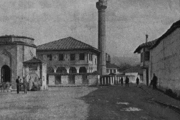Šarena Džamija
| Šarena Džamija | |
|---|---|
 | |
| Basic information | |
| Location | Tetovo, Macedonia |
| Geographic coordinates | 42°0′21″N 20°58′0″E / 42.00583°N 20.96667°E |
| Affiliation | Islam |
| Architectural description | |
| Architect(s) | Isak Bey |
| Architectural type | Mosque |
| Architectural style | Early Constantinople Ottoman Architecture |
| Completed | 1438 |
| Specifications | |
| Length | 10 m |
| Width | 10 m |
| Minaret(s) | 1 |
| Materials | Natural stones and colours |
Šarena Džamija, (Macedonian: Шарена Џамија; Albanian: Xhamia e Pashës; Turkish: Alaca Cami) meaning Decorated Mosque in English, is a mosque located near the Pena River in Tetovo, Macedonia. The mosque was originally built in 1438 and later rebuilt in 1833 by Abdurrahman Pasha.[1]
History

The Šarena Džamija was originally built in 1438.[2] The architect behind the Šarena Džamija was Isak Bey.[2]
Most mosques of the time had sultans, beys or pashas financing their constructions, but the Šarena Džamija, however, was financed by two sisters from Tetovo.[3] As with many mosques, a hammam was built nearby across the river.
The site used to include an Inn as well as a bathhouse on the other side of the river. The current courtyard of the Šarena Džamija is filled with many flowers, a fountain, and a Türbe. The octagonal "türbe" houses the resting places of Hurshida and Mensure, the two sisters who financed the construction of the mosque in 1438. [4]
Abdurrahman Pasha, a great enthusiast of art who was fond of Tetovo, reconstructed the Šarena Džamija in 1833.[5]
In 1991, the Islamic Community in Tetovo built walls around the mosque in the typical classical Ottoman style.[1]
In 2010, a renovation of the exterior paintings was completed[6] and, with a €94,700 grant from the United States State Department, the façade will be reconstructed and preserved in 2011.[7]
Architecture
Unlike the traditional Ottoman ceramic tile decorations in mosques, the Šarena Džamija has bright floral paintings.[8]
-

Details of the painted walls of the Šarena Džamija.
-

Courtyard.
-
The interior of the Šarena Džamija.
-

Šarena Džamija.
-
_-_Macedonia_-_02.jpg)
The interior of the Šarena Džamija.
-

Šarena Džamija.
More than 30,000 eggs were used to prepare the paint and glaze that went into the elaborate decorations.[9] [10] Another major difference between the Šarena Džamija and other Ottoman mosques is that the Šarena Džamija does not have a distinctive exterior dome,[11] as the architecture of the mosques styles the early Constantinople Ottoman Architecture.
The distinguishing feature of the mosque is its painted decorations. Abdurrahman Pasha commissioned, for this purpose, masters from Debar who painted the ornamentation with oil paints. In addition to the geometric and floral ornamentation, landscape is also encountered. Among the pictorial decorations, especially attractive is the depiction of Mecca, a rare and perhaps the only example of the illustration of the shrine of the Prophet Muhammad in southeast Europe.
References
- ↑ 1.0 1.1 Xhamia e Pashes
- ↑ 2.0 2.1 Pg 106 - Institut za nacionalna istorija (Skopje, Macedonia) (1979). A history of the Macedonian people (1979 ed.). Macedonian Review Editions.
- ↑ Enduring Time « Notes from Near and Far
- ↑ Thammy Evans (2007). Macedonia. Bradt Guides (Second Edition). p. 213. ISBN 978-1-84162-186-9.
- ↑ "Historical Momuments: Painted Mosque". Municipality of Tetova. Retrieved 2010-12-17.
- ↑ "Заврши обновувањето на Шарена џамија". 2010-07-29. Retrieved 2010-12-17.
- ↑ "Преубавата Шарена џамија ќе се реставрира со американска помош". 2011-09-15. Retrieved 2011-09-16.
- ↑ Lonely Planet Western Balkans - Google Books
- ↑ "Tito, Teto and Some Troubled Tourism Await You in Tetovo, Macedonia". Balkan Travellers. Retrieved December 12, 2010.
- ↑ Trankova Dimana (August 2007). "Tito, Teto and some troubled tourism await you in Macedonia". Vagabond - Bulgaria English Monthly (11).
- ↑ Balkanology :: Macedonia :: Skopje and Surroundings
| Wikimedia Commons has media related to Šarena Džamija. |
| ||||||||||||||


